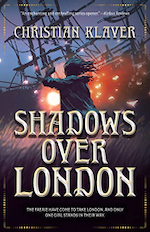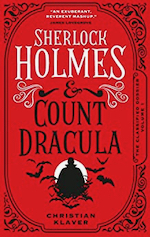by Christian Klaver
I’ve been writing the last 30 years and only recently managed to get a contract from a major publishing house, so it’s been a long, rocky road.
In that time, in addition to a few modest successes and countless, countless rejections, I’ve been accepted to a major magazine that folded before my story was printed, accepted by an agent that held onto my work for a year without actually sending anything out, accepted by another agent years later that spent two years shopping my work around before dropping me, and signed a contract with a book publisher that then had to back out when their senior editor became chronically ill.
There Are Always Ups and Downs Along the Way
By this time, I had written something in the neighborhood of a dozen books and several series. When I did finally sell a book series, it was actually two different series that I signed up for with two different publishers, but they both signed in the same month.
I was terrified but after fighting to get those contracts, I didn’t dare turn either one down.
Now I was on the hook to deliver two different series at once. My Faerie series starting with Shadows Over London (Empire of the House of Thorns) is now all complete and turned in, while the first two books for my Sherlock Holmes series (Classified Dossier: Sherlock Holmes & Count Dracula, followed by Sherlock Holmes & Mr Hyde) are done and I’m nearly done with the third: Sherlock Holmes & Dorian Gray.
So, there have been some ups and downs, for sure. A long road.
Writers Must Navigate Contradicting Advice
Writing seems easy enough, but anyone that’s written even a high school essay knows that actually turning the clear vision in your head to something on paper that actually reflects that vision is a shockingly daunting and complicated task.
There’s so much contradictory advice, even from seasoned professionals, that it’s an absolute maze to navigate. To make it worse, a novel is written mostly in solitary confinement and with little immediate reward or recognition.
Even when the product is done, there’s contradictory advice about what the public wants, about what sells, about which novels are good and which aren’t, and why. No one agrees on any of this, least of all the professionals.
For instance, no one in the publishing field can explain why some authors like J.K. Rowling explode into the field, while others with equal talent inexplicably don’t. Trying to build something as complicated as a novel, with all it’s moving parts, and contradictory advice about what’s good, is as daunting as it gets.
Writers Need to Talk to Writers
As someone who goes to conventions a lot and schmoozes with other authors whenever I can, as well as being a part of a writer’s group, I talk a lot of shop. It’s super important for all the reasons above and more.
It’s also critical for me to just meet and talk to other people fighting the same struggle. You’ll hear, as always, many different ways of accomplishing many different goals and a ton of contradictory advice – people approach artistic endeavours differently.
But you’ll also gather tips that will help you the rest of your life.
I talk to a lot of authors more experienced than me, but I also talk to many that are less experienced. When they ask for advice, like you do, I always have the same answer. Finish your book. How? Glad you asked!
How to Finish a Novel (Guaranteed!)
Write Every Day
Even just 500 words a day, even missing a day or two a week was still enough to finish a book a year for several years in a row for me. Also, writing every day means the problems of the book are never far from my mind and a lot of them get solved while I’m taking a walk or doing something else.
Make an Outline
Big or small, detailed or not, just some kind of plan, bullet points, anything.
Don’t Revise Too Much
Stop editing chapter one! It’s soooo much easier to fix novel problems once you have a complete draft, rather than working on a novel with no end.
Seems so easy, right? But it’s not. We’re back to dragging that vision out of your head and getting it, intact, onto the page, which everyone will tell is like teasing taffy through a keyhole.
The good news is that I’ve used this myself for over a dozen books and it absolutely works. When I can’t finish a book, the reasons are almost always emotional. So here are my big tips for getting past that emotional block.
The Real Secret to Writing
For me, the real secret to writing is that you have to write for love, because writing for the sake of the story is the only motivation that stays the course.
There are much better ways to make money or gain recognition. You have to love what you’re doing and find it worth doing for its own sake, or your motivation fails.
Also, have a real conversation with yourself about your own goals. I know some folks that are writing as much for therapeutic reasons as for anything else. I know some that really want a career as a genre novelist and others that just really want to get that one, cool idea into the book of their dreams.
Is this one novel more important than your writing career? (I think any answer is OK here, as long as you have an answer.)
Would you ghost write someone else’s book? Would you write a book that someone else plotted? Would you change the gender, name, race, whatever of your main character if it made the work more publishable?
This is often a nuanced answer. (I’d be willing to change this, say, but not that.)
Every Author Houses an Always-Right Egomaniac Inside
Which brings me nicely to managing your own ego. The truth is that every author houses a raging, frothing-at-the-mouth, always-right egomaniac inside.
But we also house an absolute on-their-knees supplicant that’s always willing to listen and willing to listen.
Of course, you need to cultivate both. I highly recommend a writer’s group or some other way of getting feedback, but you’ll also have to get very judgemental about what advice to accept and what advice to ignore. This is a skill that’s almost as difficult as writing, but so necessary as a writer.
Give Yourself Permission to Suck as a Writer
Another huge tool is what I call ‘Giving Yourself Permission to Suck’.
Often with a first draft, off of my napkin bullet-point outline, I’ll start writing and find myself really unhappy with the results. I used to just stop and try and figure out what I needed to do differently, but here you have the danger of noodling forever and never finishing the book.
I know literally a hundred people, most of them excellent wordsmiths with really nifty ideas, that will never finish any book because they’re still noodling. This is the trap. You have to give yourself permission to put a sucky first draft on paper and press on. You can go back and fix it later when you have a complete draft and your vision is clearer.
So, my best advice is write for yourself, at least to start. This is a painful, emotional journey, writing even one book, let alone multiple ones, and I can’t imagine going through it for something that you don’t love.
Don’t do it for the money. Just don’t. There are much better, faster, more reliable ways, to make money. You need extra cash, pick up an extra job bartending or something. Much more likely to make more money in the short term, and probably in the long term, too.
* * *
 Christian Klaver is the author of the Empire of the House of Thorns series, starting with Shadows Over London. He also wrote The Classified Dossier – Sherlock Holmes and Count Dracula, the beginning of the Classified Dossier series. He’s worked as book-seller, bartender and a martial-arts instructor before settling into a career in internet security.
Christian Klaver is the author of the Empire of the House of Thorns series, starting with Shadows Over London. He also wrote The Classified Dossier – Sherlock Holmes and Count Dracula, the beginning of the Classified Dossier series. He’s worked as book-seller, bartender and a martial-arts instructor before settling into a career in internet security.
He lives just outside the sprawling decay of Detroit, Michigan, with his wife, Kimberly, his daughter, Kathryn, and a group of animals he refers to as The Menagerie.
For more information on Christian and his work, please see his website and connect with him on Facebook and Twitter.
 Shadows Over London: The Faerie have come to take London, and only one girl stands in their way.
Shadows Over London: The Faerie have come to take London, and only one girl stands in their way.


 Sherlock Holmes and Count Dracula:
Sherlock Holmes and Count Dracula: